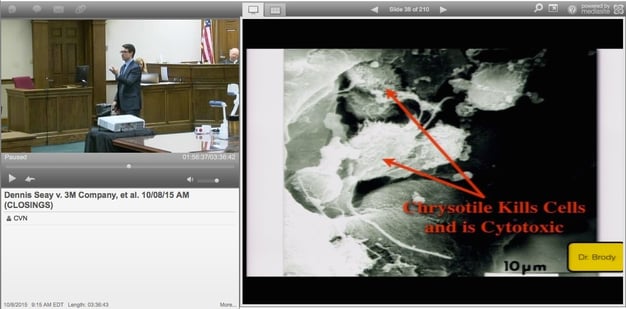
Spartanburg — A South Carolina state court jury slammed Texas-based materials company Celanese Corp. with a $14 million verdict on Thursday in a lawsuit brought by the family of a maintenance worker who died of cancer after being exposed to asbestos at a polyester fiber plant in the 1970’s.
The family of Dennis Seay, who died of mesothelioma in 2014 at the age of 70, was awarded $12 million in compensatory damages and $2 million in punitive damages following a 13-day trial. A second defendant in the case, gasket seller John Crane Inc., was cleared of all liability by the unanimous jury, according to a Courtroom View Network webcast of the proceedings.
Seay worked in a Celanese plant between 1971 and 1979 while an employee of Daniel Construction Co., which Celanese hired to perform maintenance and repair work. His lawsuit, filed in 2013, claimed Celanese and John Crane were aware of the dangers that asbestos insulation and asbestos-containing gaskets posed to workers but failed to give Seay adequate warnings of the risks.
The verdict is at the high end of what the Seay family’s attorney, Chris Panatier of Dallas-based Simon Greenstone Panatier Bartlett PC, asked jurors to award during his opening statement, when he said between $10 and $15 million was appropriate compensation. Panatier told CVN that Celanese made no settlement offers before going to trial.
Panatier said the jury saw “voluminous” evidence proving that Celanese knew about the cancer risks from asbestos long before Seay began work at the fiber plant. The company’s medical director attended a landmark conference on asbestos dangers in 1964, Panatier argued, and the historic Occupational Safety and Health Act passed in 1970, known as OSHA, set strict asbestos exposure limits for workers.
“You’ve got a company that had no way of running away from the fact that they knew the hazards of asbestos, period,” Panatier said.
He said the case is notable because asbestos trials involving an employee of an independent contractor going to verdict against the premises owner are comparatively rare.
“You don’t see a lot of premises cases tried,” Panatier said.
Celanese argued Daniel Construction was responsible for Seay’s exposure, because it had agreed to oversee the safety of its workers doing maintenance in the fiber plant and failed to provide them with respirators. John Crane claimed that Seay’s cancer was caused by working with asbestos insulation exposed to the open air and not from asbestos sealed inside its gaskets.
A spokesman for Celanese told CVN the company is disappointed by the verdict and plans to appeal. An attorney for John Crane did not respond to a request for comment.
Daniel Construction wasn’t named as a defendant in the suit, because according to Panatier South Carolina law precludes workers from suing their employers for asbestos exposure. He said Celanese made a summary judgment motion claiming that Seay met the legal definition of a Celanese employee due to the nature of his work at the plant, but the motion was denied by Judge Garrison Hill, which Panatier said could serve as the basis for the company's appeal of the verdict.
Celanese generated $6.4 billion in revenue in 2012, according to the company's financial reports.
The prevailing defendant, John Crane, argued during the trial that dangerous levels of exposure to asbestos sealed inside gaskets are impossible, and that there have been no medical studies linking work with gaskets to mesothelioma. Panatier said he didn’t think jurors cleared the company because of those arguments, but because of confusion over a jury instruction.
Panatier said members of the jury told him after the trial that they were confused by an instruction stating that for John Crane to be liable, their gaskets had to leave the company's possession in a defective state. The jurors didn’t understand that the lack of a warning itself can be a defect, according to Panatier.
“The product doesn’t have to be broken to be defective,” he said.
In the coming months, Panatier said his firm is expecting to take asbestos cases to trial in California, Missouri, Arizona and Iowa. He said the wide range of jurisdictions his firm litigates in distinguishes it from other regional asbestos firms.
“What we’re doing that’s a little bit different than a lot of places is that we’re willing to try cases wherever the case is,” he said. “We’re kind of all over the place."
The case is Dennis Seay v. 3M Company, et al., case number 2013CP4203915, in South Carolina’s Seventh Judicial Circuit Court.
The plaintiffs are represented by Chris Panatier of Simon Greenstone Panatier Bartlett PC.
John Crane is represented by Mark Tivin of O'Connell Tivin Miller & Burns LLC.
Celanese is represented by H. Lane Young of Hawkins Parnell Thackston & Young LLP.
E-mail David Siegel at dsiegel@cvn.com
Click here to check out more asbestos trials in CVN's one-of-a-kind online video archive.





